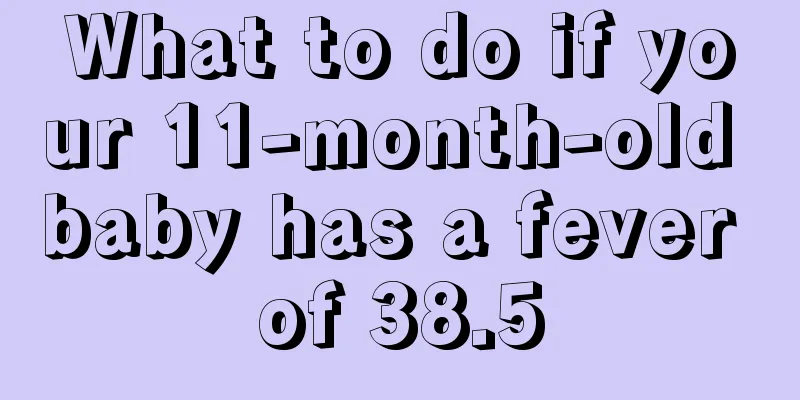Why does my child’s nose itch and bleed?

|
Children's immunity cannot be compared with that of adults, so most of the general disease incidence rates occur in children. Some children will experience itchy noses and nosebleeds. So what is going on? Will it affect the child’s health? Next, I will explain to you why children have itchy noses and nosebleeds. In what situations are nosebleeds common in children? 1. Inflammation of the nasal cavity: Allergic rhinitis that is not controlled for a long time will reduce the elasticity of the nasal mucosa and blood vessels, which can easily lead to bleeding. Sinusitis and hypertrophy of the nasal polyps cause increased nasal discharge and irritation of the nasal mucosa, which is also one of the important causes of nosebleeds in children. 2. Trauma: Accidental injuries to the head and face and bad habits of picking your nose can damage blood vessels and cause bleeding. 3. Vitamin deficiency: Improper feeding of infants and young children or picky eating habits of some children can cause vitamin deficiency, which can cause changes in the elasticity of blood vessel walls and make them prone to bleeding. 4. Tumors: Nasal tumors are rare in children. Nasopharyngeal hemangioma is more common in young people, but the incidence rate in children has been increasing in recent years. Since the lesions of nasopharyngeal hemangioma are located deep in the nasal cavity, it is easy to misdiagnose without professional examination. What should I do if I suddenly have a nosebleed? If you experience nose bleeding, you must remain calm and don't panic, otherwise your blood pressure will increase and the bleeding will worsen. If you feel blood flowing into your mouth, try to spit it out to avoid irritating your stomach. When there is a small amount of bleeding, stuff a cotton ball into the nostril and press the closed foramen for 5-10 minutes. If the bleeding does not subside, you can extend the time appropriately and apply cold compress on the nose and forehead. The effect will be better if Yunnan Baiyao is added. If bleeding is severe or recurring, you should go to the hospital immediately. Things to note when seeing a doctor for nosebleeds 1. Being too nervous often leads to incoherent speech. Patients and their families should try to remain calm and briefly explain the onset of the disease and past medical history (whether there are other diseases) to the doctor. 2. In order to find the bleeding point, the doctor may use certain drugs to shrink the nasal mucosa and perform an endoscopic examination. If you are allergic to certain drugs, you should inform us in time. 3. If the doctor thinks that the bleeding may be caused by other reasons, blood tests and X-rays will be performed. If you have undergone similar examinations recently, you need to bring the relevant information with you when you see the doctor. 4. If it has been confirmed that nose bleeding is indeed caused by other diseases, do not give up further treatment of the cause just because the bleeding has stopped. This will lay the seeds for more serious bleeding in the future. How to prevent nosebleeds? Nosebleeds sometimes occur repeatedly, so you should pay more attention to prevention. In terms of diet, you should eat more fresh vegetables and fruits, supplement adequate vitamins, and keep your bowel movements smooth. Quit bad smoking and drinking habits. In dry seasons, you can apply some antibiotic ointment or drop some peppermint paraffin oil into the nose to keep the nasal mucosa moist. If you have high blood pressure, heart disease and other chronic diseases, you should actively seek treatment to avoid recurrent nosebleeds. Adults who frequently have blood in their mucus or repeated small amounts of bleeding should be extra vigilant. Because the early symptom of nasal cavity, sinus and nasopharyngeal tumors is blood in the nasal discharge. The sites of these tumors are relatively hidden and difficult to detect. Once obvious symptoms such as nasal congestion or ears, face, and teeth appear, the lesions are likely to be extensive or have metastasized. Therefore, the two sayings of "treating both the symptoms and the root cause" and "preventing problems before they occur" are very appropriate when applied to the treatment of nosebleeds. The above is the relevant article about why children have itchy noses and nosebleeds. I hope that after reading the above article, you can have a comprehensive understanding of why children have itchy noses and nosebleeds. Parents should also pay more attention to their children's physical condition. |
<<: What should I do if my child has hemorrhoids?
>>: Why do children like to blink?
Recommend
At what age should children brush their teeth?
Although the baby's teeth have not yet grown ...
What are the recipes for children to strengthen their physique?
Nowadays, many children have very poor physical c...
What to do if the baby won't eat anything
Babies are more important than anything else to p...
What should I do if my child is overweight?
It is said that having a fat baby is very good, b...
How long does it take to save a drowning child?
Summer is here and many children like to play in ...
What should children eat to nourish their brains? What should they eat to make them smarter?
Today's parents place their hopes on the next...
How many times a day is normal?
Under normal circumstances, people need to defeca...
How many months does it take for a Down syndrome baby to lift his head?
Babies with Down syndrome may take about 6 months...
What should I do if my one-year-old baby has hot palms and soles?
Babies are the hope of the family. Parents hope t...
What is rickets in children?
There are many common diseases in young children....
My child's nose keeps bleeding, what's wrong?
I believe most people have experienced nose bleed...
Why does my baby often strain?
Because after the baby is born, the mother will d...
What is the reason for the baby's fever and convulsions?
We parents nowadays take good care of our childre...
Can children grow taller by drinking milk?
I believe that height is a very important issue f...
Seven month old baby
Infants and young children grow very fast. The el...









